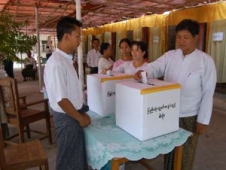 Burma has barred foreign observers and journalists from the country’s controversial elections. The Election Commission said observers were not necessary because Burma-based diplomats could monitor the polls. Burma-based journalists would also be sufficient to cover the election, the commission said.
Burma has barred foreign observers and journalists from the country’s controversial elections. The Election Commission said observers were not necessary because Burma-based diplomats could monitor the polls. Burma-based journalists would also be sufficient to cover the election, the commission said.
Diplomats instead of journalists?
There are about 25 foreign news organizations registered in Burma, most are staffed by Burmese citizens. Most foreign journalists are banned from Burma, where domestic media is tightly controlled.
Scores of foreign news organizations are expected to try to cover the elections, but now will be forced to do so from outside the country.
Vincent Brossel from the media freedom organization Reporters Without Borders, says this latest restriction shows the government has no intention of holding free and fair elections.
"One of the conditions for a democratic election is again refused by the government," said Brossel. "They have all control on the Burmese media and now that the foreign journalists are denied to access to Burma during the elections that gives no chances to get transparency and accountability."
 According to Reporters Without Borders information, Burma has more than 150 privately-owned newspapers and magazines but they are all subject to pre-publication censorship by the Press Scrutiny and Registration Division, commonly known as the Press Scrutiny Board, which is run by a military officer.
According to Reporters Without Borders information, Burma has more than 150 privately-owned newspapers and magazines but they are all subject to pre-publication censorship by the Press Scrutiny and Registration Division, commonly known as the Press Scrutiny Board, which is run by a military officer.
This kind of censorship is virtually unique in the world and prevents the emergence of any editorial independence.
A “censors’ paradise,” Burma is ranked 174 out of 178 countries in the 2009 Reporters Without Borders press freedom index. Burma, according to Freedom House released “Worst of the Worst 2010: The World’s Most Repressive Societies” annual report, is among least free countries in the world.
Sham elections
Critics say the 7 November elections are a sham aimed at consolidating military rule.
"We don’t need foreign observers. We have abundant experience in holding elections," Election Commission chairman Thein Soe told a press conference in the capital, Naypyitaw. "Besides, the election laws enacted are very balanced and easy to understand."
 On journalists, he said that representatives of international news agencies were resident in Burma and press statements would be released "in a timely manner", so there was no need for foreign reporters.
On journalists, he said that representatives of international news agencies were resident in Burma and press statements would be released "in a timely manner", so there was no need for foreign reporters.
Burma’s neighbors in the Association of Southeast Asian Nations offered to observe the elections, but the government turned them down.
New old story?
Burmese authorities say the elections will mark a key step on their "road map to democracy". But many outside the country say the laws under which they will be held are unfair and aimed at perpetuating military rule.
A quarter of the seats in parliament have already been reserved for the military. Many senior military officers have also shed their uniforms so that they can campaign for election as civilians, potentially increasing the military’s power in parliament.
 Parties not aligned with the government have complained of harassment while campaigning.
Parties not aligned with the government have complained of harassment while campaigning.
Strict election laws forced the largest opposition party, led by pro-democracy leader Aung San Suu Kyi, to be dissolved. Aung San Suu Kyi, who remains under house arrest, has called for an election boycott. Her party, the National League for Democracy, won the last elections in 1990 but was never allowed to take power.
The government also refuses to allow millions of ethnic minorities a vote in parts of the country where militias have fought for independence. Thailand’s Defense Ministry says it is beefing up security along the border with Burma. There are concerns the Burmese military will crack down on ethnic minorities or on dissidents, causing an inflow of refugees.
HRH Oslo, based on BBC News and Voice of America News information. See the original articles here and here.





